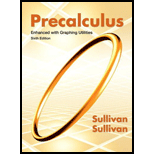
Concept explainers
Maximum Number of real positive or negative real zeros of the given polynomial function using Descartes’ Rule of signs and the potential rational zeros of each polynomial function using rational zeros theorem.
Answer to Problem 25AYU
The degree of the polynomial is 3. Therefore the number of real zeros by real zero theorem can be at most .
Therefore there will be 1 positive real zero.
Therefore there can be two negative real zeros or no negative real zero.
The rational zeros .
Explanation of Solution
Given:
The degree of the polynomial is 3. Therefore the number of real zeros by real zero theorem can be at most .
to
There is 1 variation of sign of nonzero coefficient of by Descartes’ Rule of signs;
Number of positive real zeros number of variations of signs of or number of variations less than even integer.
Therefore there will be 1 positive real zero or no positive real zero.
Let us consider by replacing by .
to to
There are two variations of signs of nonzero coefficient of by Descartes’ Rule of signs;
Number of negative real zeros number of variations of signs or number of variations less than even integer.
Therefore there can be two negative real zeros or no negative real zero.
Rational zeros theorem provides information about the rational zeros of a polynomial function with integer coefficients.
If in its lowest terms is a rational zero of , then is a factor of and is the factor of .
Here and .
Zeros of , .
Zeros of 2, .
The potential rational zeros .
Chapter 4 Solutions
Precalculus Enhanced with Graphing Utilities
Additional Math Textbook Solutions
Calculus: Early Transcendentals (2nd Edition)
A First Course in Probability (10th Edition)
A Problem Solving Approach To Mathematics For Elementary School Teachers (13th Edition)
Elementary Statistics
Elementary Statistics (13th Edition)
- Pls help ASAParrow_forwardPls help ASAParrow_forward9. a) Determie values of a and b so that the function is continuous. ax - 2b f(x) 2 x≤-2 -2x+a, x ≥2 \-ax² - bx + 1, −2 < x < 2) 9b) Consider f(x): = 2x²+x-3 x-b and determine all the values of b such that f(x) does not have a vertical asymptote. Show work.arrow_forward
- Pls help ASAParrow_forward3. True False. If false create functions that prove it is false. Note: f(x) = g(x). a) If_lim ƒ(x) = ∞ and_lim g(x) = ∞,then_lim [ƒ(x) − g(x)] = 0 x→ 0+ x→0+ x→0+ b) If h(x) and g(x) are continuous at x = c, and if h(c) > 0 and g(c) = 0, then h(x) lim. will = x→c g(x) c) If lim f(x) = 0 and lim g(x) = 0 then lim f(x) does not exist. x-a x-a x→a g(x)arrow_forwardPls help ASAParrow_forward
- 15. a) Consider f(x) = x-1 3x+2 and use the difference quotient to determine the simplified expression in terms of x, for the slope of any tangent to y = f(x). Also, determine the slope at x = 2. 15 b) Determine the equation of the tangent to f(x) at x = 2. Final answer in Standard Form Ax + By + C = 0, A ≥ 0, with no fractions or decimals.arrow_forwardPls help ASAParrow_forwardPls help ASAParrow_forward
 Calculus: Early TranscendentalsCalculusISBN:9781285741550Author:James StewartPublisher:Cengage Learning
Calculus: Early TranscendentalsCalculusISBN:9781285741550Author:James StewartPublisher:Cengage Learning Thomas' Calculus (14th Edition)CalculusISBN:9780134438986Author:Joel R. Hass, Christopher E. Heil, Maurice D. WeirPublisher:PEARSON
Thomas' Calculus (14th Edition)CalculusISBN:9780134438986Author:Joel R. Hass, Christopher E. Heil, Maurice D. WeirPublisher:PEARSON Calculus: Early Transcendentals (3rd Edition)CalculusISBN:9780134763644Author:William L. Briggs, Lyle Cochran, Bernard Gillett, Eric SchulzPublisher:PEARSON
Calculus: Early Transcendentals (3rd Edition)CalculusISBN:9780134763644Author:William L. Briggs, Lyle Cochran, Bernard Gillett, Eric SchulzPublisher:PEARSON Calculus: Early TranscendentalsCalculusISBN:9781319050740Author:Jon Rogawski, Colin Adams, Robert FranzosaPublisher:W. H. Freeman
Calculus: Early TranscendentalsCalculusISBN:9781319050740Author:Jon Rogawski, Colin Adams, Robert FranzosaPublisher:W. H. Freeman
 Calculus: Early Transcendental FunctionsCalculusISBN:9781337552516Author:Ron Larson, Bruce H. EdwardsPublisher:Cengage Learning
Calculus: Early Transcendental FunctionsCalculusISBN:9781337552516Author:Ron Larson, Bruce H. EdwardsPublisher:Cengage Learning





